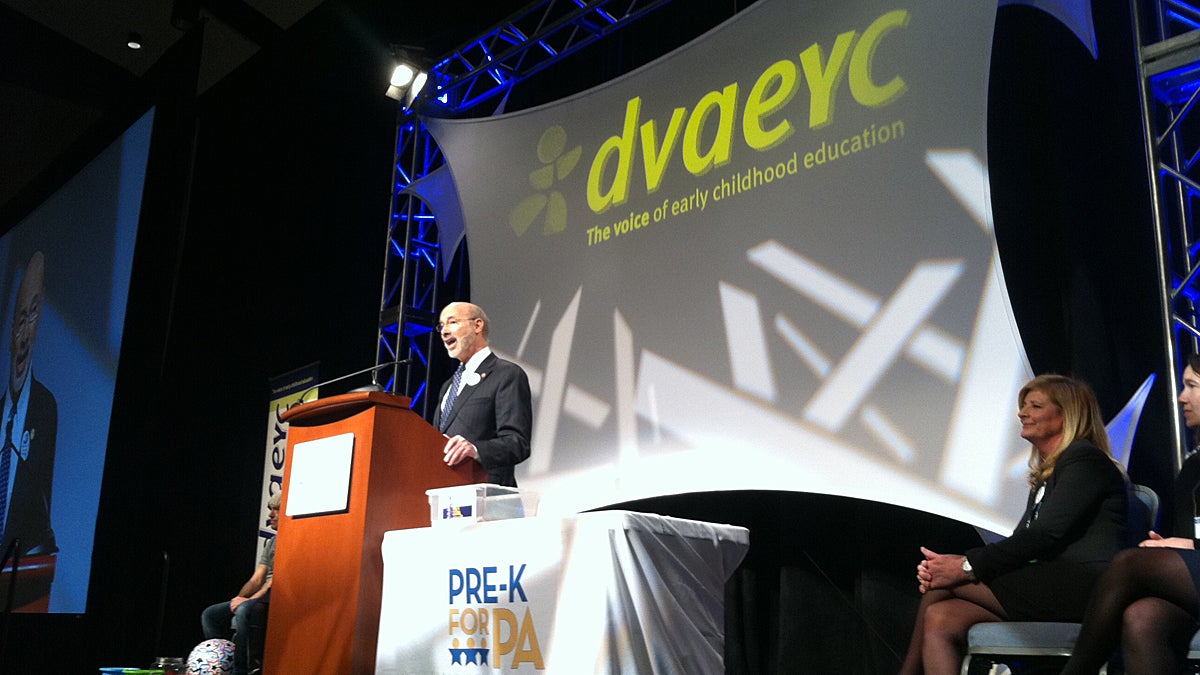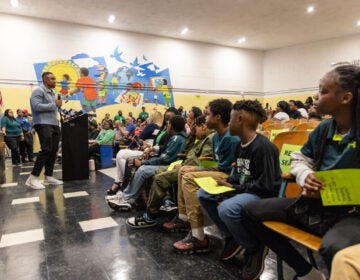Wolf, advocates pushing for big ticket high-quality preschool in Pa.
Listen
Pennsylvania Governor Tom Wolf speaks at the Delaware Valley Association for Education of Young Children's conference. (Laura Benshoff/WHYY)
Early childhood advocates are asking families across Pennsylvania to scrounge through their couch cushions on behalf of high-quality preschool programs.
Advocates hope Pennies 4 Pre-K, a new initiative by advocacy group Pre-K for PA, will draw attention to a much larger pot of funding that could be headed their way: $120 million in Governor Tom Wolf’s proposed education budget.
Appearing at the Delaware Valley Association for the Education of Young Children (DVAEYC) this week, Governor Wolf promoted his budget as a longterm investment. “Children who participate in high-quality preschool education perform better in school, they graduate in higher rates,” said Wolf. “If all those things happen, our society works better and so does our economy.”
As the crowd of educators dropped pennies into colorful plastic buckets, Wolf anticipated some of the criticism already brewing in the legislature against his expansive education budget. “We’re taking precious, scarce public dollars and we’re looking for priorities that are going to make our commonwealth better,” said Wolf.
High-quality and high cost
Wolf’s budget calls for an additional 14,000 new, high-quality pre-kindergarten seats through the Head Start and Pre-K Counts programs for this fall. The $120 million to fund these seats is “down payment,” increasing enrollment in state-funded programs by 75 percent. Only 7.5 percent of Pennsylvania children under five are currently enrolled in a high-quality preschool, and tuition for these programs can run over $10,000 a year without government subsidy.
Executive Director of DVAEYC Sharon Easterling said the pennies were symbolic. “We hope to be able to raise enough money to fund a couple of slots. We want the legislature to do the rest.”
Wolf faces an uphill battle in approving his ambitious education budget through a legislature controlled by Republicans, many of whom have criticized his spending.
Politically, pre-K can garner bipartisan support but in recent years greater awareness to the uneven outcomes of some programs has undermined some of this support, according to Ron Haskins, Brookings Institute fellow and co-director of the Center on Children and Families.
“I don’t think anybody disagrees that if you have a good program, and follow a curriculum, and have good teachers, then you can have immediate impacts on kids social impacts and they will be better prepared for school,” said Haskins. “There I think the agreement ends.”
Debate about long-term benefits, such as higher graduation rates and a lower likelihood of going to prison, have come under fire recently.
Haskins said implementing early childhood education programs across the country proved difficult to standardize and monitor, although some states like Oklahoma have had better luck delivering high-quality across the board with their pre-kindergarten programs.
Part of the problem, said Haskins, is cost. “The teacher is probably the single most important ingredient in a high-quality pre-k program,” but many teachers in child care facilities are paid close to minimum-wage.
Advocates and researchers, like Haskins, make a distinction between unskilled childcare workers and pre-kindergarten teachers, who have certifications in early childhood education and use vetted curriculum.
Reading pre-kindergarten’s tea leaves, Haskins pointed to President Obama’s pre-school initiatives, neither of which have “gone anywhere.”
Groups like Pre-K for PA nonetheless are calling for a half a billion dollar investment to bring universal access to pre-kindergarten across the state in the next four years.
Any universal pre-kindergarten legislation is a “tough sell,” according to Haskins.
But he said there is an economic argument to be made for the universal policy. “Everyone would like help paying for their house payment or their car. The difference in preschool is their may be a public benefit. That’s one justifications economists often use,” said Haskins.
Early childhood education advocates will be dropping their pennies off in Harrisburg, hoping to drive home that point.
This disclosure: the William Penn Foundation supports both Pre-K for PA and WHYY.
WHYY is your source for fact-based, in-depth journalism and information. As a nonprofit organization, we rely on financial support from readers like you. Please give today.




